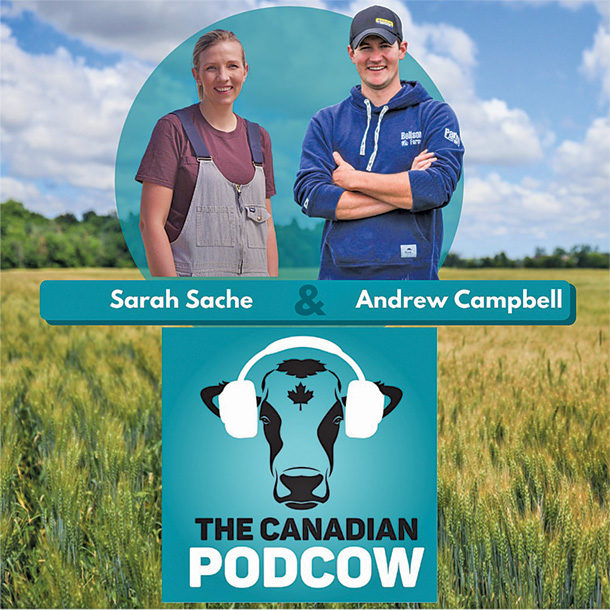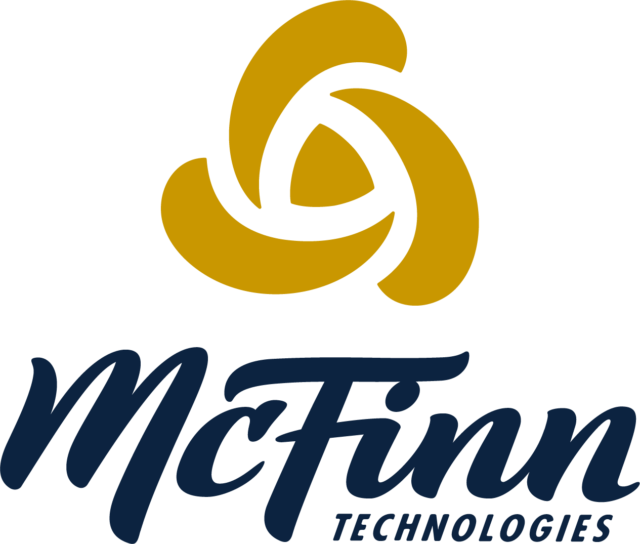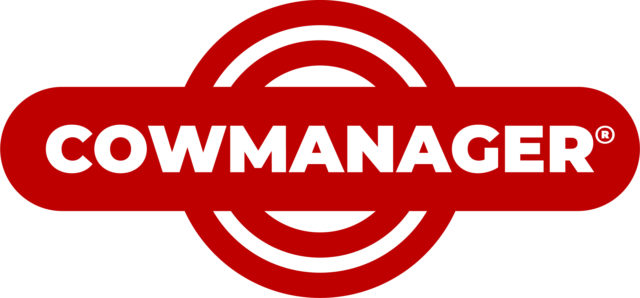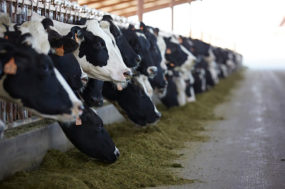“The concern and helplessness felt by all of us was shared no matter where we were located in the country,” recalls Sache from her farm in Rosedale, British Columbia, about 30 minutes from the Sumas Prairie, east of Chilliwack.
As vice-chair of the BC Dairy Association, Sache was very involved in response efforts to navigate the disaster, from funding programs to advocacy work, and she shared updates on the evolving situation through the podcast she co-hosts with Campbell, which launched in September. “I love the feeling of national farmer-to-farmer connection the podcast brings to our industry,” Sache says.
Campbell agrees that The Canadian Podcow offers an important national perspective that helps raise the unified voice of Canadian dairy farmers. Growing up on a dairy farm in the rural community of Strathroy, Ontario, about 35 kilometres west of London, Campbell brings not only firsthand farming experience to the podcast but also a background in journalism. “When I came home to the farm, I didn’t quite give up all that media communications stuff,” he says. “It was a hobby, but one of the things I’ve been fortunate to do is be involved in podcasts.”
Campbell and his wife moved onto his multigenerational family farm a decade ago, though they’ve been helping to farm there for the last 15 years. Sache has also been farming for the same length of time, but her entrance into the industry was through marriage: Her husband is a third-generation dairy farmer.
Together, the two hosts provide a cross-country point of view. Though farmers are all working under the Blue Cow umbrella, Sache explains in reference to DFC’s nationally recognized logo that adorns dairy products made with 100% Canadian milk, there are distinct perspectives from one province to the next.
“It’s really important that we are a national podcast,” says Sache. “We have our own businesses, but we are all involved with Dairy Farmers of Canada.”
Pointing to initiatives like proAction and the recent commitment for dairy farmers to reach net zero greenhouse gas emissions from farm-level dairy production by 2050, Sache says it can be hard to stay abreast of what is happening elsewhere in the country. “[These initiatives] affect our businesses, but farmers are very hands-on, so it’s hard for them to understand or connect with the bigger picture,” she says.
It’s also essential, Campbell says, that the podcast has a French counterpart (Entre deux traites, hosted by Sabrina Caron and Jean-François Janelle). “The topics are the same,” he says, “but the conversation is different.”
DFC is a proud sponsor of both The Canadian Podcow and Entre deux traites, supporting their efforts to present regional perspectives on national issues. It’s about accessibility and providing a gateway to participation that helps normalize the conversation, Sache says. “It’s amazing how engaged producers are with it,” she adds.
At its heart, the podcast is simply about making connections through conversation. Campbell calls it a venue to share stories. “Sarah and I ask our own questions [because] it’s about what dairy farmers think,” he says. “It has to be relevant.”
The topics discussed by Sache and Campbell are indeed relevant to dairy farmers and timely. For instance, on a recent episode focused on the Code of Practice for the Care and Handling of Dairy Cattle, which is presently being updated by the National Farm Animal Care Council, the co-hosts welcomed guest expert Nicole Sillett, DFC’s assistant director of sustainable production. It quickly became the podcast’s most popular episode to date, as it provided farmers with a snapshot of what to expect in the updated code.
“We were able to distill down a huge, and honestly overwhelming, topic to touchpoints that could give a person some sense about the content and the importance of engagement,” Sache says. “We’re connecting beyond the farm, [creating] a bridge to the rest of the industry.”
“We want to hear from farmers,” Campbell says, “so we can continue to ask questions on their behalf, but we can only do this based on feedback from the industry as a whole.”
Response so far has been positive and encouraging. While the medium may be new to some, many listeners are turning to The Canadian Podcow for better understanding of the topics affecting Canadian dairy and the podcast’s ability to touch upon issues as they unfold – such as updates on the code or the BC flood response – is part of its appeal.
“It’s just on-demand radio,” Campbell says. “I enjoy listening to podcasts in spring, summer and fall when I’m in the tractor, and from people that I’ve talked to, as long as we can stay relevant, come up with interesting topics and guests, [we will reach] our fellow dairy farmers as well as others in the industry.
To contribute a topic idea, suggestion for a guest, or address an issue affecting dairy farming in Canada, reach out to The Canadian Podcow on Facebook at Facebook: The Canadian Podcow or by email at The Canadian Podcow.
Current and past episodes of The Canadian Podcow and Entre deux traites can be found at Dairy Farmers of Canada-The Canadian Podcow (in English) and Producteurs Laitiers du Canada - Entre Deux Traites (in French).
Dairy Farmers of Canada (DFC) is the national policy, lobbying and promotional organization representing Canadian dairy producers. DFC strives to create stable conditions for the dairy sector in our country. It also seeks to maintain policies that promote the sustainability of Canadian dairy production and promote dairy products and their health benefits. Visit dairyfarmers.ca for more information.









